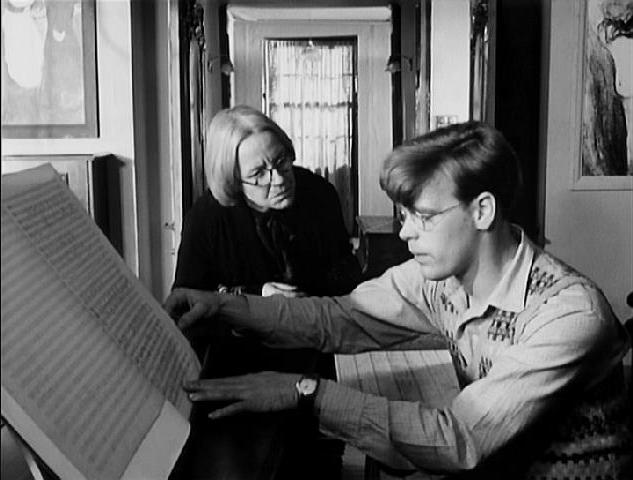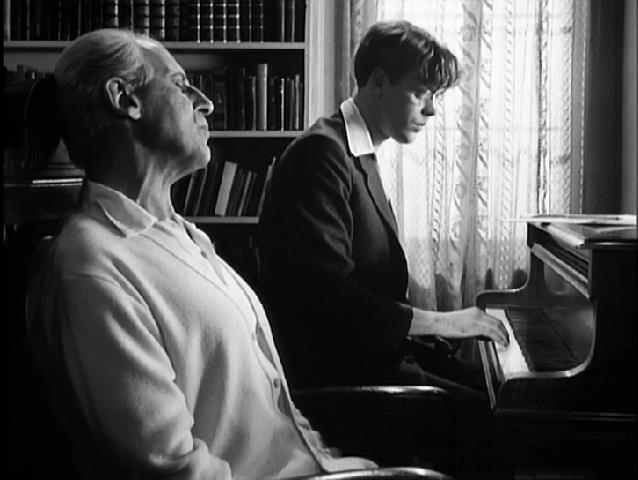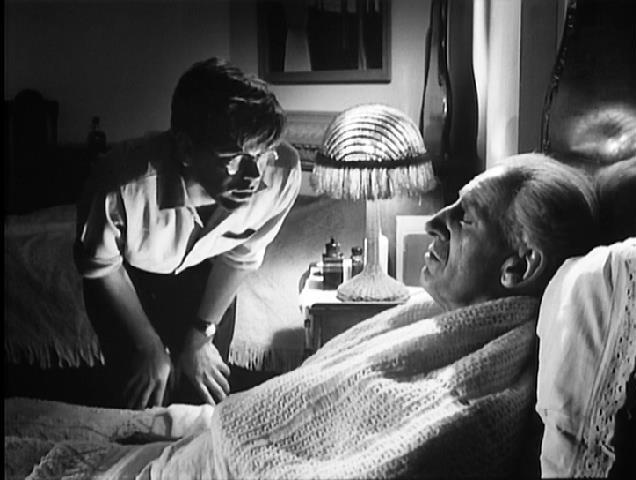The bulk of the film follows the relationship of the two men — and that of Jelka — which is anything but smooth, as becomes evident when Delius tries to dictate music by uttering a series of very unmusical noises (“Terr terr terr—terr terr terr”) rather than call out the notes. In their first sitting, Delius manages to reduce Fenby to tears and send him running from the room, which in turn prompts Delius to tell Jelka, “That boy is no good.” Cooler heads — and the even-tempered, long-suffering Jelka prevail — and an uneasy alliance that turns into a deep, if very odd, friendship comes into being.
In one sense, that’s really all there is to the film, but that hardly explains the warmth, the sense of generosity, and the overall quality of the film. Some of it is due to the performances. Max Adrian is here — in his first of four indelible performances for Russell — simply incredible. He manages the unthinkable task of making the essentially unlovable lovable. There is nothing about Delius that is easy. He’s always demanding, always thinking of himself. And he’s demanding in ways that have nothing to do with his music, as in his constant attacks on Fenby’s recent conversion to Catholicism, exhorting the pious young man to “throw away those great Christian blinkers,” and arguing, “English music will never be any good till they get rid of Jesus,” (Years later, Ken Russell quipped to me, “Well, they got rid of Jesus and it still isn’t any good”—not that I think he really believed that, but he couldn’t resist the comeback, especially after being subjected to my Max Adrian impression with the line.)
But Adrian isn’t acting in a vacuum. Christopher Gable — in his first of six Russell films — more than holds his own as the sensitive Fenby, while Maureen Pryor — in her first of two Russell appearances — makes Jelka both strong and heartbreaking. And then there’s the quiet intensity with which Russell handles the material — not to mention the frequently astonishing scenes where he matches music and image in that way that no one else ever did.
What is perhaps most interesting about the film thematically lies in its portrait — a common one for Russell — of presenting just how far short of a man’s work the man himself is likely to fall. This is often mistaken for anger on his part by detractors, for a sense that Russell himself feels betrayed by his own heroes. This, I think, is entirely off-base. On the contrary, what he presents is admiration for what wonders and beauty these tragically flawed human beings were able to create. As the years go by — if you follow the progression of Russell’s filmography — you can detect a growing sense that he comes to suspect that these flaws were part of what allowed them to create their works, not something that held them back. The truth lies more in their creations than in their lives.
There’s something else afoot here — a theme that Russell returns to time and again. Here’s the classic case of one talent — Fenby’s — devoting itself, even obliterating itself in the service of another, probably greater talent. This kind of sacrifice is central to Russell’s work and his essentially Catholic (even if lapsed) worldview. But I can’t help but wonder if it isn’t more personal than that, since so much of Russell’s work is centered on the celebration of other people’s talents. Isn’t Russell himself a kind of Eric Fenby, devoting his life to shining a light on the works of others? The question is whether he ever completely realized that in so doing, he was creating masterworks of his own.
Classic World Cinema by Courtyard Gallery will present Song of Summer Friday, March 6, at 8 p.m. at Phil Mechanic Studios, 109 Roberts St., River Arts District (upstairs in the Railroad Library). Info: 273-3332, www.ashevillecourtyard.com









Before you comment
The comments section is here to provide a platform for civil dialogue on the issues we face together as a local community. Xpress is committed to offering this platform for all voices, but when the tone of the discussion gets nasty or strays off topic, we believe many people choose not to participate. Xpress editors are determined to moderate comments to ensure a constructive interchange is maintained. All comments judged not to be in keeping with the spirit of civil discourse will be removed and repeat violators will be banned. See here for our terms of service. Thank you for being part of this effort to promote respectful discussion.